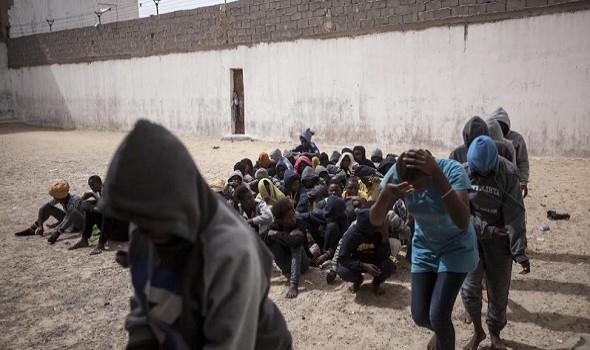Photographing Libya's slave market
Photographing Libya's slave market

Libya is a slave market run by militias and privately armed groups: that's the stark verdict of Mexican photographer Narciso Contreras.
He went there last year to take the pictures now on show at London's Saatchi Gallery to chronicle what he assumed was simply a transit point in a movement of migrants out of Africa. That would have been harrowing enough, but what he found was far, far worse.
The migrants are totally at the mercy of militias. The migrants are a currency, cash cows, to be brutally herded, iprisoned, raped and traded.
"Taken to detention centres, they are locked up until they pay a release fee of between 700 and 2,000 Libyan dinar, 200-700 USD. Those who cannot pay will be sold on to to other militia groups or have to work to buy their freedom," he writes. The words "detention centre" are a little misleading: they are human warehouses, where prisoners are packed together in conditions that would be cruel in an abattoir. There's no ventilation, no basic sanitation: "In the forty degree heat, the combined stench of sweat, urine and faeces is vomit-inducing."
Contreras shows a detention centre information board displaying pictures of dead bodies in the desert and washed up on the shore: "The photographs are aimed at psychologically impacting the detainees as they walk along the corridor."
I recoiled at the prominent use of one of Contreras's images, a bare-breasted prisoner sitting up straight on a dirty mattress in her cell, but subsequently understood that anyone seeing this mentally disturbed, raped prisoner would never rid themself of the image ("Stepping into a detention centre is like passing through into a parallel world. It was like looking at the dead, as if the women no longer had a soul") and would want to insist on others seeing it, to draw attention to the whole desperate, unforgivable situation:
"Stretching from Africa to Europe, this human trafficking trade is a brutal reminder of the failure of our politicians and their policies. It's an act so terrible, so devoid of empathy, its raw brutality so hard to comprehend that we can only attempt to witness it and to record. Only then, can we hope that it will never be forgotten."
Sadly, it will be forgotten, if not deliberately overlooked, and like the genocide resolution, "Never again", it will be repeated.
* It's hard to find a positive note among this important 32-photo exhibition, but Contreras notes that in at least one area a group of about 20 residents started collecting bodies and burying them in a makeshift cemetery. One of the organisers tells him that they needed not money but forensic scientists to set up a DNA database "in case one day someone comes looking for the dead."
* Carmignac Photojournalism Award Exhibition: Narcico Contreras is at the Saatchi Gallery, Duke of York's HQ, King's Road, SW3 until 16 June. Info: http://www.saatchigallery.com/art/narciso_contreras.php
+ Fondation Carmignac established the Carmignac Photojournalism Award in 2009 with the aim of funding and promoting an investigative photo report on human rights violations each year. The winner receives a €50,000 grant to produce an in-depth, in-the-field photo essay. After it has been completed, the Fondation provides further support, financing a monograph on the investigation and working with the photographer to develop and stage an international touring exhibition. Four photos from the essay are subsequently included in the Carmignac Collection.
Narciso Contreras is the 7th Laureate of the award.
ALSO ON SHOW:
* Sergey Ponomarev: A Lens on Syria, more than 60 photographs on life in Government-controlled areas in 2013-2014. and on the plight of people seeking refuge in Europe in 2015-2016, Imperial War Museum, Lambeth Road, SE1, until 3 September. Info: 7416 5000.
* Syria: Story of a Conflict, intimate display exploring the origins, escalations and impact of the Syria conflict through objects and video, Imperial War Museum, Lambeth Road, SE1, until 3 September. Info: 7416 5000
* A Perilous Journey: Stories of Migration, following two men and two women on their journeys fleeing conflict and persecution in Syria and Iraq, free, School of Oriental and African Studies, Thornhaugh Street, WC1, until 24 June. Info: 7898 4046/ https://www.soas.ac.uk/gallery/ gallery[at]soas.ac.uk
* Call Me by My Name: Stories from Calais and Beyond, multimedia exhibition + Images of Migration, Migration Museum at the Workshop, 26 Lambeth High Street, SE1, until 30 July. Info: http://www.migrationmuseum.org
+ 24 May, Carmignac Photojournalism Award: Documenting Libya, Mexican photographer Narciso Contreras discusses his recent work on the reality of human trafficking in Libya, 7pm, £12.50/£10, Frontline Club, Norfolk Place, W2. Info: events[at]frontlineclub.com/ 7479 8940


